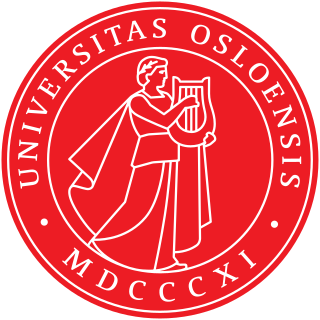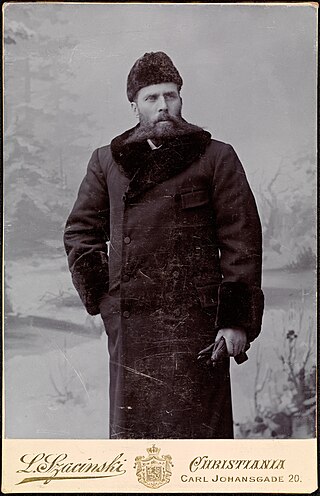
Fridtjof Wedel-Jarlsberg Nansen was a Norwegian polymath and Nobel Peace Prize laureate. He gained prominence at various points in his life as an explorer, scientist, diplomat, humanitarian and co-founded the Fatherland League.

The University of Oslo is a public research university located in Oslo, Norway. It is the oldest university in Norway. Originally named the Royal Frederick University, the university was established in 1811 as the de facto Norwegian continuation of Denmark-Norway's common university, the University of Copenhagen, with which it shares many traditions. It was named for King Frederick VI of Denmark and Norway, and received its current name in 1939. The university was commonly nicknamed "The Royal Frederick's" before the name change, and informally also referred to simply as Universitetet.

Norwegian Computing Center is a private, independent, non-profit research foundation. NR carries out contract research and development in the areas of computing and quantitative methods for a broad range of industrial, commercial and public service organizations in Norway and internationally. NR is one of Europe's largest research environments in applied statistics and its projects cover a large variety of applied and academic problems. NR's offices are located near the university campus Blindern in Oslo, and adjacent to Oslo Science Park (Forskningsparken).

Otto Neumann Knoph Sverdrup was a Norwegian sailor and Arctic explorer.

The Svalbard Treaty recognises the sovereignty of Norway over the Arctic archipelago of Svalbard, at the time called Spitsbergen. The exercise of sovereignty is, however, subject to certain stipulations, and not all Norwegian law applies. The treaty regulates the demilitarisation of the archipelago. The signatories were given equal rights to engage in commercial activities on the islands. As of 2023, Norway and Russia make use of this right.
The Norway Scholarship is a scholarship to the University of Oxford that is awarded in Norway. Norway Scholars receive funding for one or two years of study and research at Oxford University, and the scholar always becomes a member of Wadham College.

The Nansen International Office for Refugees was an organization established in 1930 by the League of Nations and named after Fridtjof Nansen, soon after his death, which was internationally in charge of refugees from war areas between 1930 and 1939. It is noted for developing the Nansen passport which allowed stateless people to travel between countries. It received the Nobel Peace Prize in 1938.

Lysaker is an area in Bærum Municipality, Viken County, Norway. Lysaker is the easternmost part of Bærum and borders Oslo proper. Lysaker was initially a farming community, later becoming a residential area. Today it is primarily known as a business and trade area, and a public transport hub. It is considered part of Stor-Oslo, and is home to offices of numerous domestic and international businesses.

Henrik Mohn was a Norwegian astronomer and meteorologist. Although he enrolled in theology studies after finishing school, he is credited with founding meteorological research in Norway, being a professor at the Royal Frederick University and director of the Norwegian Meteorological Institute from 1866 to 1913.

Idun Reiten is a Norwegian professor of mathematics. She is considered to be one of Norway's greatest mathematicians today.

Iver Brynild Neumann is a Norwegian political scientist and social anthropologist. He is Director of the Fridtjof Nansen Institute at Polhøgda, Lysaker, a position he has held since December 2019. From 2012-2017 he was the Montague Burton Professor of International Relations at the London School of Economics and Political Science. He has also served as Research Director and Director at the Norwegian Institute of International Affairs (NUPI) and Adjunct Professor in International Relations at the Norwegian University of Life Sciences.
The Nansen Medal for Outstanding Research is a Norwegian medal awarded by the Nansen Fund.

Polhøgda is the home of the Fridtjof Nansen Institute. It was originally built as the private home of Norwegian explorer Fridtjof Nansen. The manor home's architecture is Roman Revival, and the former estate lies between Lysaker and Fornebu in Bærum, Norway.
Ragnar Fjørtoft was an internationally recognized Norwegian meteorologist. He was part of a Princeton, New Jersey team that in 1950 performed the first successful numerical weather prediction using the ENIAC electronic computer. He was also a professor of meteorology at the University of Copenhagen and director of the Norwegian Meteorological Institute.
Geir Hønneland is a Norwegian political scientist, former Director of the Fridtjof Nansen Institute (FNI) and professor II at the University of Tromsø and Nord University.
The Fram Committee Nansen Award is a Norwegian academic award for polar research named after Fridtjof Nansen. The award has been given out since 1961 by the University of Oslo. It can be awarded to Norwegian researchers who, through a dissertation or otherwise, have made significant contributions to the exploration of the polar areas in biology, geography, geophysics, geology, or oceanography. The award is conferred on Nansen's birthday, October 10.

Arild Moe is a Norwegian political scientist and Senior Research Fellow at the Fridtjof Nansen Institute in Lysaker, Norway. He has an MSc. from the University of Oslo and has also studied Russian and public law. Moe has been affiliated with the Fridtjof Nansen Institute since 1983 and has been a Guest Researcher at Stanford University and Adjunct Associate Professor at the Norwegian University Center in Saint Petersburg.
Tor Håkon Jackson Inderberg is a Norwegian political scientist and a Senior Research Fellow at the Fridtjof Nansen Institute in Lysaker, Norway. He holds a Master’s degree from the Norwegian University of Science and Technology in Trondheim, and a PhD from the University of Oslo. His PhD thesis (2012) focused on the climate change adaptation and governance of electricity sectors in Norway and Sweden.
Steinar Andresen is a Norwegian political scientist and Research Professor at the Fridtjof Nansen Institute (FNI) in Lysaker, Norway. He holds a Cand. Polit. degree in political science from the University of Oslo, where he served as professor from 2002-2006, and he has been a guest researcher at Princeton University, New Jersey, the Brookings Institution in Washington DC, and the International Institute for Applied Systems Analysis (IIASA) in Austria.
Willy Østreng is a Norwegian political scientist.













